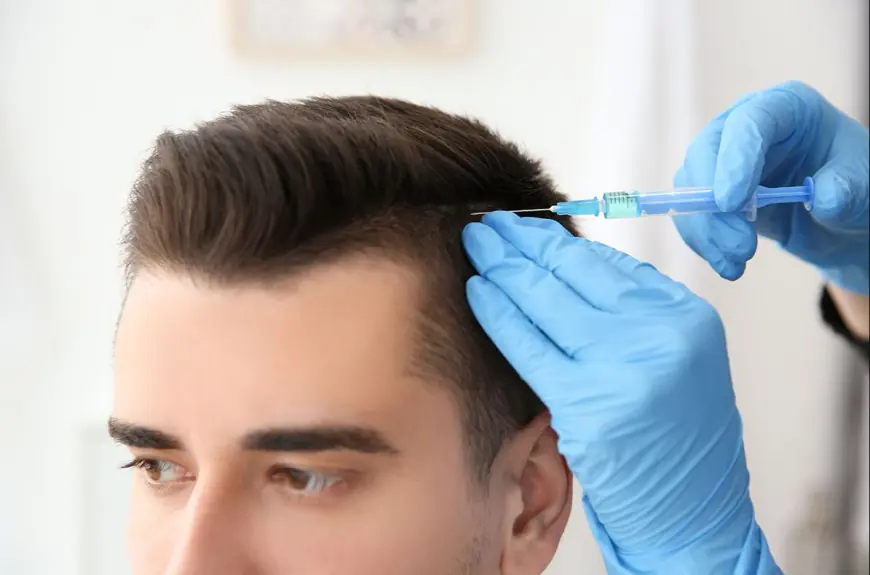Hair Specialist Doctor for Scalp Conditions

If you’re experiencing discomfort, irritation, or visible changes to your scalp, you might consider consulting a Hair Specialist Doctor in Dubai to address the issue. Scalp conditions can range from mild irritations to chronic conditions, and getting professional help can make a significant difference in your overall hair and scalp health. In this article, we’ll explore the most common scalp conditions that a hair specialist can treat and how they approach diagnosing and managing these issues.

1. Dandruff: The Persistent Flake Issue
One of the most common scalp conditions is dandruff, characterized by itchy, flaky skin on the scalp. While it’s often thought of as a simple cosmetic issue, dandruff can sometimes signal an underlying condition, such as seborrheic dermatitis or fungal infections. A hair specialist will examine your scalp to determine the root cause of the flakes and recommend specialized shampoos or topical treatments that target the specific type of dandruff. Proper diagnosis can lead to faster relief and help you manage this condition more effectively.
2. Seborrheic Dermatitis: Beyond Ordinary Dry Scalp
Seborrheic dermatitis is a chronic condition that can cause red, scaly patches on the scalp along with excess oil production. It can be mistaken for simple dandruff, but it’s much more severe and persistent. A hair specialist will evaluate the severity of the condition and may recommend medicated treatments to manage the symptoms and control flare-ups. Managing seborrheic dermatitis often requires a combination of lifestyle changes, prescribed treatments, and sometimes even changes in hair care products.
3. Psoriasis: Understanding Scalp Inflammation
Psoriasis is a chronic autoimmune condition that can affect the scalp, causing red, scaly patches that may crack and bleed. This condition requires specialized care, as it’s not just a cosmetic issue but a health concern that can lead to significant discomfort. A hair specialist will perform a detailed examination of the scalp and may suggest treatments like topical steroids, vitamin D analogs, or light therapy. Psoriasis often requires long-term management, and the right approach can help control flare-ups and improve your scalp’s health.
4. Alopecia Areata: When the Immune System Attacks Hair Follicles
Alopecia areata is a condition where the immune system mistakenly attacks the hair follicles, leading to patchy hair loss. It can occur suddenly and without warning, making it particularly distressing for those affected. While there is no known cure for alopecia areata, a hair specialist can provide treatments to manage the condition, including corticosteroid injections or topical treatments that may help slow hair loss or promote regrowth. A thorough consultation can also help manage any emotional or psychological challenges associated with hair loss.
5. Fungal Infections: The Hidden Culprit Behind Hair and Scalp Issues
Fungal infections, such as ringworm (tinea capitis), can cause significant damage to both the scalp and hair follicles. These infections often result in hair loss, scalp itching, and visible bald patches. A hair specialist can diagnose fungal infections through a physical examination and, if necessary, laboratory tests to confirm the presence of fungi. Treatment typically involves antifungal shampoos or oral medications that target the infection and prevent it from spreading to other areas of the scalp.
6. Scalp Acne: When Pores Become Blocked
Just like acne on the face, scalp acne occurs when hair follicles and pores on the scalp become clogged with excess oil, sweat, and dead skin cells. This can lead to painful bumps or pimples on the scalp that can affect hair health. A hair specialist may recommend topical treatments, cleansers, or other interventions to clear the scalp, reduce inflammation, and prevent scarring. Scalp acne is often linked to poor hygiene or hormonal imbalances, so a specialist may also advise lifestyle changes, including adjustments to your hair care routine.
7. Excessive Oiliness: Oily Scalp Syndrome
An excessively oily scalp can lead to greasy hair and clogged hair follicles. This can result in an unclean scalp, itching, and even hair thinning over time. A hair specialist can help identify whether this condition is due to hormonal fluctuations, diet, or an overactive sebaceous gland. Treatments may involve specific shampoos or topical solutions that help balance oil production, along with recommendations for managing your overall scalp health through diet and lifestyle changes.
8. Scalp Sensitivity and Pain: When Your Scalp Hurts
If you experience a painful or sensitive scalp, this could be due to a variety of factors, such as scalp tension, poor hair care practices, or an underlying scalp condition like eczema or folliculitis. A hair specialist will work with you to identify potential triggers, which may include tight hairstyles, harsh hair products, or underlying inflammatory conditions. Treatment options often include gentle hair care practices, soothing topical treatments, and lifestyle changes that reduce scalp sensitivity.

9. Hair Loss Related to Scalp Conditions
Many scalp conditions can contribute to hair loss, whether it's through inflammation, infection, or scarring. For instance, conditions like alopecia areata, seborrheic dermatitis, and psoriasis may lead to thinning hair or patchy bald spots. A hair specialist will evaluate your scalp’s health and determine if your hair loss is related to one of these conditions. Once diagnosed, they’ll create a personalized treatment plan to manage the condition and, in some cases, promote hair regrowth.
10. When to See a Hair Specialist Doctor
If you notice persistent symptoms like itching, redness, flaking, or hair loss, it’s time to consult with a Hair Specialist Doctor. Ignoring scalp conditions can lead to further complications, including irreversible hair damage. A hair specialist will provide expert advice and care, ensuring your scalp remains healthy and your hair remains as vibrant and strong as possible.
Final Thoughts
Scalp conditions can affect not just your hair but your overall well-being. Whether it’s dandruff, psoriasis, or a fungal infection, seeking help from a skilled hair specialist can significantly improve your scalp health. With a tailored treatment plan, you can address the root cause of your scalp condition and restore balance to your scalp, promoting healthy hair growth and overall comfort.












